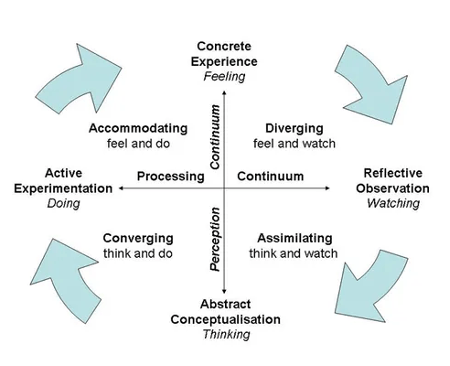Learning Frameworks
To deliver our interdisciplinary program, we use elements of a variety of learning frameworks. Each of these frameworks has been thoroughly researched and tested and provides the structure to guide a deep and purposeful learning experience.
Experiential Learning
Kolb in the 1980s proposed a model for ‘Experiential Learning’ that provides a relevant framework for the sort of learning that goes on in many middle schooling programs. A great deal of the learning is based on experience rather than working on the second-hand experiences of others. When starting work with a class, good practice is to start from what students know. Too often what goes on in classrooms is not connected to the students’ experiences or to a world to which they can relate. Kolb’s model is summarised in this diagram.
The four stages devised by Kolb and others, have been used to justify learning in the field for tertiary geography students but form a useful framework for learning at lower levels. Experiences of students are used as a basis for reflection on a personal basis. At a secondary level discussion in groups can enhance the reflective process. From reflection, concepts are formed – setting up explanations to explain what has been observed. This can lead to testing of their ideas in slightly different situations.
Diagram from: Saul McCleod 2017; ‘Kolb's Learning Styles and Experiential Learning Cycle, https://www.simplypsychology.org/learning-kolb.html
Project-based Learning
At City Cite we want students to look at issues that are obvious in the city and need solutions. In small groups students work on open ended questions in what has been known in some circles as a rich task approach. We encourage the use of research-informed models for measuring, calibrating, and improving student practice.
Student learning goals for projects include standards-based on content as well as skills such as critical thinking, problem solving, communication, self-management, project management, and collaboration. In other words, a project-based learning approach.
What is Program Based Learning? To help teachers do PBL well, below is a comprehensive, research-informed model for PBL to help teachers, schools, and organizations measure, calibrate, and improve their practice. In Gold Standard PBL, projects are focused on students acquiring key knowledge, understanding, and success skills.

